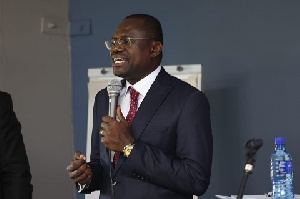Accra, OCT. 29, GNA - Civil society groups in the West African Sub-Region on Wednesday kicked against an Economic Partnership Agreement (EPA) being negotiated by the European Union and the Economic Community of West African States (ECOWAS).
According to the group, the EPA negotiation, launched in Cotonu, Benin on October Six, this year, was a threat to food security because it could destroy local markets and domestic production in the Sub-Region. Speaking at a press conference at the end of a three-day Regional Workshop on Rrade and Security in West Africa, Mr Kingsley Offei-Nkansah, Deputy-General Secretary of the Ghana Agricultutre Workers' Union (GAWU) said the EPA negotiation expected to come into force in 2008, would mean the removal of tariff barriers, thus depriving West African governments of substantial revenues.
"It also means the dumping of cheap products, especially, agricultural products that are extremely subsidized on our markets and destroying the livelihood of majority of the population," he added. Mr. Offei-Nkansah said although the EPA was expected to contribute to poverty eradication, sustainable development and help in sub-regional integration, the new agreement threatened food security.
"The direction of the just launched EPA negotiations is seeking to establish Free Trade Areas between the EU and ECOWAS, in a manner that is extremely insensitive to the development concerns of ECOWAS and the African Caribbean Pacific countries", he noted.
The workshop, which brought together participants from five Francophone and two Anglophone countries, including Ghana, Benin and Senegal was organised by GAWU and the Friedrich Ebert Stiftung (FES} in Accra.
Mr Offei-Nkansah accused the EU of not addressing their Common Agriculture Policy, which enabled EU countries to dump a range of farm produce on fragile markets of poor countries, which acted as a disincentive to exports in West African produce. Participants at the workshop called for greater regional integration for the overall development of West Africa.
EU/ECOWAS agreement not in the interest of local producers
Accra, Oct. 29, GNA - Civil society groups in the West African Sub-Region on Wednesday kicked against an Economic Partnership Agreement (EPA) being negotiated by the European Union and the Economic Community of West African States (ECOWAS) saying it was inimical to the interest of local producers.According to the group the EPA negotiation launched in Cotonu, Benin on October 6 was a threat to food security because it could destroy local markets and domestic production in the Sub-Region.
Speaking at a press conference at the end of a three-day Regional Workshop on Trade and Security in West Africa, Mr Kingsley Offei-Nkansah, Deputy-General Secretary of the Ghana Agriculture Workers' Union (GAWU) said the EPA negotiation expected to come into force in 2008, would mean the removal of tariff barriers thus depriving West African governments of substantial revenues.
"It also means the dumping of cheap products, especially, agricultural products that are extremely subsidized on our markets and destroying the livelihood of the majority of the population," he said. Mr Offei-Nkansah said although the EPA was expected to contribute to poverty eradication, sustainable development and help in sub-regional integration the new agreement threatened food security. "The direction of the just launched EPA negotiations is seeking to establish Free Trade Areas between the EU and ECOWAS, in a manner that is extremely insensitive to the development concerns of ECOWAS and the African Caribbean Pacific Countries", he noted.
The workshop, which brought together participants from five Francophone and two Anglophone countries including Ghana, Benin and Senegal was organised by GAWU and the Friedrich Ebert Stiftung (FES} in Accra.
Mr Offei-Nkansah accused the EU of not addressing their Common Agriculture Policy, which enabled EU countries to dump a range of farm produce on fragile markets of poor countries, which acted as a disincentive to exports in West African produce. Participants at the workshop called for greater regional integration for the over all development of West Africa.












